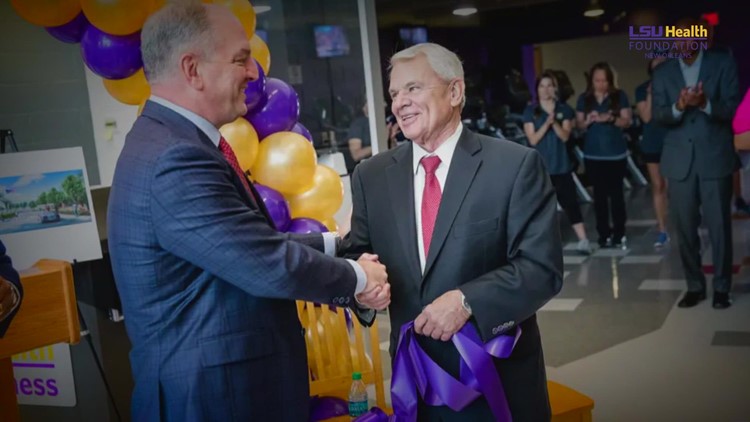NEW ORLEANS — While he was chancellor of LSU Health in New Orleans, Larry Hollier violated university policy — and perhaps state ethics laws — by lobbying for special scholarships for his grandchildren and pressuring a program director to admit his grandson’s girlfriend, a recent LSU investigation found.
Last year, Hollier denied getting involved in the more than $93,100 in scholarships his three grandsons received from LSU Board of Supervisors members between 2013 and 2018. “I didn’t have anything to do with the scholarships,” he told a reporter at the time.
But a 24-page LSU compliance report completed in late September shows that’s not true. A compliance officer wrote that the “record directly and repeatedly contradicts” Hollier’s denial.
Emails show Hollier intervened to help arrange scholarships for each of his grandsons and thousands of dollars in awards for his grandson’s girlfriend.
Hollier also contacted a subordinate — the director of an LSU physician’s assistant program — to recommend that his grandson’s girlfriend be admitted. She was ranked 81st among 119 applicants and was ultimately selected over a candidate ranked 57 spots higher.
The program director who admitted her, Rachel Chappell, said in an interview that Hollier didn’t disclose his personal connection to the candidate.
“I truly took his recommendation to heart,” Chappell said. “In retrospect, this was wildly naive of me.”
Frank Wasser, the compliance officer, wrote in his report that Hollier’s actions violated LSU Health in New Orleans’ conflict of interest rules and may have violated state ethics laws.
Wasser cited a state prohibition against public employees coercing someone into providing something of economic value, along with a law against participating in any transaction that provides an economic benefit to a family member.
Wasser recommended that LSU’s legal counsel review the matter and consider referring it to the Louisiana Board of Ethics or law enforcement.
It’s unclear if the Office of General Counsel has taken either of those steps. LSU Health in New Orleans spokesperson Leslie Capo said the organization is “reviewing a confidential personnel matter” and that she can’t comment.
Rafael Goyeneche, president of the Metropolitan Crime Commission, said the matter would likely be taken no further than the state ethics board, which can censure or fine officials as much as $10,000.
“I don’t see a criminal side to this,” he said. “This is an administrative and possibly an ethics violation.”
Hollier, who stepped down as chancellor a year ago in the wake of separate allegations that also involved conflicts of interest, didn’t return voicemail and text messages seeking comment. He remains an LSU faculty member and retains a salary he previously said is half of the more than $1 million a year he made as chancellor, a position he had held since 2005.
Hollier’s conflicts
Issues with Hollier’s management practices first came to light with last fall’s release of a scathing LSU audit. Among the findings: Hollier pushed for improper pay bumps for those in his inner circle in 2020, including the son of top administrator.
Hollier’s involvement with his grandchildren’s scholarships wasn’t mentioned in that report, though records show the behavior dates to 2013.
That was when Hollier set up a meeting with Williams Jenkins, who at the time was LSU’s interim president, to discuss giving a scholarship to one of his grandsons, according to the compliance report. Ultimately, Jenkins gave a second grandson, Tyler Cole, a $7,600 scholarship. Jenkins could not be reached for comment.
Later that year, an Hollier assistant forwarded an application for Sam Cole, another grandson, to LSU’s office of the vice president, emails show. An assistant replied that someone from that office “will see about getting his scholarship awarded.”
After that scholarship ended, Hollier wrote a letter to the Board of Supervisors in 2015 describing Sam Cole as an intern who impressed with his “knowledge, commitment and perseverance.”
“I respectfully request that he continue to receive the scholarship from the LSU Board of Supervisors,” Hollier wrote. He didn’t mention that Sam Cole was his grandson.
Between 2014-17, Sam Cole, a Texas resident at the time, received waivers of fees normally paid by out-of-state students totaling more than $69,400. That was more money given to all but two LSU students in the last decade, records show.
Especially precious
Sam Cole’s scholarships came from former LSU president King Alexander, who said he did not review scholarship applications and relied on the board to make selections for him. “These were strictly Board of Supervisors scholarships with no input from me,” said Alexander, who as president was allowed to hand out 15 scholarships a year.
Board members every year dole out roughly 240 scholarships with a total value that climbs above $1 million. In last year’s round, the board received more than 500 applications.
There are no special bars to clear, other than acceptance to the university, and the applications do little to filter for academic excellence, talent or financial need. That gives board members broad discretion to make hand-picked selections.
Out-of-state scholarships are considered especially “precious,” one former board member said, because non-resident fees double the cost of tuition. And among the 15 scholarships each board member can hand out each year, just two may be used to cover extra out-of-state costs.
In a 2016 email to then board member Stephen Perry, Hollier wrote, “I would greatly appreciate it if you could help my grandson with a Supervisors out of state scholarship.” Perry would go on to give the grandson, Maxwell Cole, more than $16,000 in two scholarships over the next two years.
In an interview last week, Perry said he has no recollection of Hollier’s message. Perry said that the Coles were raised by a single mother in Texas, which could have contributed to his selection.
“I know this doesn’t sound very good, but that was a few years ago and I don’t really recall it very much,” said Perry, now CEO of the New Orleans & Co. tourism agency. “If there’s circumstances … and it had to do with things like a single mom, I very well could have said, ‘Sure.’”
Altogether, Hollier’s grandchildren were given more than $77,000 in waivers of out-of-state fees. Taylor Terzo, girlfriend to one of Hollier’s grandsons, also received more than $16,000 in scholarships after Hollier said in 2017 that he would approach the board member who sponsored her, Lee Mallett.
Mallett said he doesn’t recall Hollier contacting him. “It would have had no bearing,” Mallett said. “I would have looked at the application and determined if she was qualified.” He had also sponsored Terzo the two years prior, 2015-16.
Efforts to reach each of Hollier’s grandsons for comment were unsuccessful. Michelle Cole, their mother, has said that each were qualified and followed the proper procedures while submitting their applications. All three graduated from LSU, while Sam Cole made the dean’s list at least four times.
Giant mistake
Hollier also intervened on Terzo’s behalf in 2018 when she was applying for acceptance into the physician’s assistant program at LSU’s School of Allied Health.
Hollier phoned Chappell, the program director, and said Terzo would make an “excellent PA based on his professional experience with her,” according to LSU’s compliance report. Chappell said Hollier never contacted her about a candidate prior to that or since.
She was fearful that Hollier could meddle with the PA program’s coordination with the School of Medicine, and told a compliance investigator that Hollier had a “reputation for sidelining people who did not do what he requested.” Chappell also genuinely respected his medical opinion, she said.
Chappell admitted Terzo over the objection of the three other members of the program’s admissions committee, according to the compliance report, though the report states that her decision had the support of the Allied Health dean.
Terzo’s admission removed a higher-ranked candidate who is not named in the compliance report, though the report states that “publicly available information appears to indicate” that the student never obtained a PA degree.
Chappell defended Terzo, insisting she was qualified for admission and that the admissions ranking system used several measures that were subjective. Still, Chappell now calls her actions a “giant mistake.”
“I thought one thing and it was another and I am deeply regretful about it,” said Chappell, who resigned from LSU to take another university job last month.
Terzo received a master’s degree in physician assistant studies from LSU last year, according to an online bio. Attempts to reach her for comment were unsuccessful.



